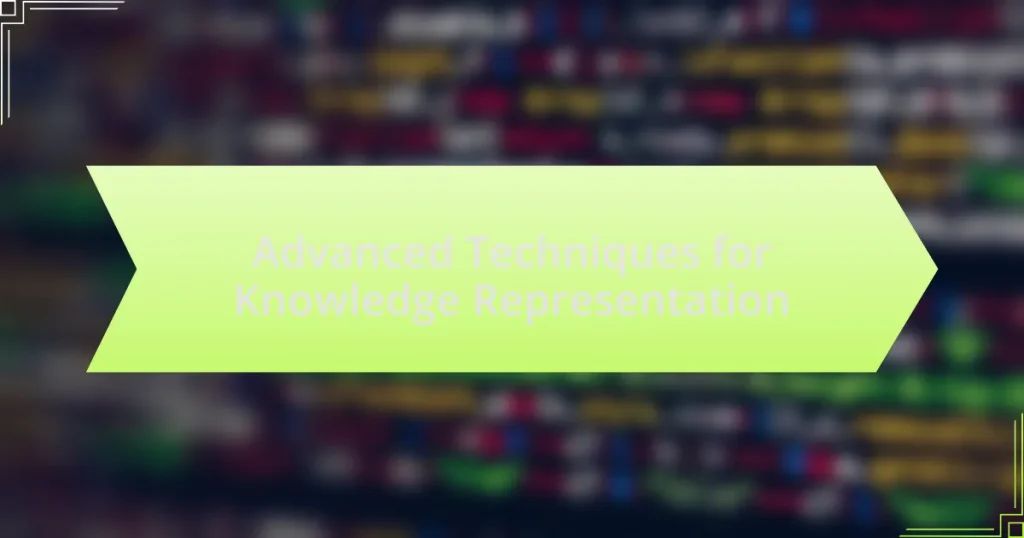Advanced techniques for logic-based game development encompass methods such as finite state machines, behavior trees, and rule-based systems, which enhance character behaviors and gameplay dynamics. These techniques improve player engagement through dynamic storytelling, adaptive AI, and procedural generation, leading to personalized experiences that respond to player choices. Key components of this development include game mechanics, algorithms, and user input handling, with programming languages like C++, C#, and Python commonly utilized. Successful games like “Portal” and “The Witness” exemplify the effectiveness of these techniques, demonstrating their impact on gameplay mechanics and player retention.

What are Advanced Techniques for Logic-based Game Development?
Advanced techniques for logic-based game development include the use of finite state machines (FSMs), behavior trees, and rule-based systems. Finite state machines allow developers to manage complex character behaviors by defining states and transitions, which enhances gameplay dynamics. Behavior trees provide a hierarchical structure for AI decision-making, enabling more flexible and scalable character actions. Rule-based systems utilize a set of predefined rules to dictate game logic, allowing for intricate interactions and outcomes based on player choices. These techniques are validated by their widespread application in successful games, demonstrating their effectiveness in creating engaging and responsive gameplay experiences.
How do these techniques enhance gameplay experience?
Advanced techniques for logic-based game development enhance gameplay experience by providing players with more engaging and immersive interactions. These techniques, such as dynamic storytelling, adaptive AI, and procedural generation, allow for personalized gameplay that responds to player choices and actions. For instance, dynamic storytelling can adjust the narrative based on player decisions, creating a unique experience for each player, which has been shown to increase player retention and satisfaction. Additionally, adaptive AI can tailor challenges to individual skill levels, ensuring that players remain challenged without becoming frustrated. Procedural generation introduces variability in game environments, making each playthrough distinct and encouraging exploration. These enhancements lead to a more satisfying and memorable gameplay experience, as evidenced by player feedback and engagement metrics in successful games utilizing these techniques.
What specific elements of gameplay are improved by these techniques?
The specific elements of gameplay improved by advanced techniques for logic-based game development include player decision-making, game balance, and narrative engagement. These techniques enhance player decision-making by providing more complex and meaningful choices, allowing players to experience a deeper level of strategy and consequence. Game balance is improved through refined algorithms that ensure fair competition and challenge, which can lead to increased player satisfaction and retention. Additionally, narrative engagement is heightened as these techniques enable dynamic storytelling that adapts to player actions, creating a more immersive experience. For instance, research shows that games employing adaptive narrative techniques can increase player investment by up to 30%, demonstrating the effectiveness of these advanced methods in enhancing gameplay elements.
How do these techniques influence player engagement and retention?
Techniques in logic-based game development significantly enhance player engagement and retention by creating immersive experiences and fostering a sense of achievement. These techniques, such as adaptive difficulty, personalized content, and dynamic storytelling, keep players invested by tailoring challenges to their skill levels and preferences. For instance, a study by the International Journal of Human-Computer Interaction found that games employing adaptive difficulty can increase player retention rates by up to 30%, as players feel continuously challenged without experiencing frustration. Additionally, personalized content can lead to a 20% increase in engagement, as players are more likely to return to games that resonate with their interests and play styles. Thus, the implementation of these advanced techniques directly correlates with improved player engagement and retention metrics.
Why is logic-based game development important in the gaming industry?
Logic-based game development is important in the gaming industry because it enhances gameplay mechanics and player engagement through structured problem-solving and decision-making processes. This approach allows developers to create complex game systems that respond logically to player actions, resulting in a more immersive experience. For instance, games like “Portal” and “The Witness” utilize logic-based puzzles that challenge players to think critically, thereby increasing the game’s replay value and overall satisfaction. Furthermore, the integration of logic in game design can lead to more efficient coding practices, reducing bugs and improving performance, which is crucial for maintaining player retention in a competitive market.
What role does logic play in game mechanics and design?
Logic serves as the foundational framework for game mechanics and design, ensuring that player actions lead to predictable and meaningful outcomes. In game development, logic dictates the rules governing interactions, character behaviors, and environmental responses, creating a coherent experience that players can understand and engage with. For instance, in puzzle games, logical reasoning is essential for players to deduce solutions based on the established rules, enhancing cognitive engagement. Furthermore, the implementation of logic in programming languages, such as C# or Python, allows developers to create complex systems that respond dynamically to player input, reinforcing the importance of logical structures in maintaining game balance and flow.
How does logic-based development differentiate games in a competitive market?
Logic-based development differentiates games in a competitive market by enabling more sophisticated gameplay mechanics and enhanced player experiences. This approach allows developers to create complex systems that respond dynamically to player actions, fostering deeper engagement and strategic thinking. For instance, games utilizing logic-based frameworks can implement advanced AI behaviors, procedural content generation, and intricate puzzle-solving elements, which are often lacking in traditional game design. As a result, titles like “The Talos Principle” and “Portal” have gained recognition for their innovative use of logic, setting them apart from competitors and attracting a dedicated player base.

What are the key components of logic-based game development?
The key components of logic-based game development include game mechanics, algorithms, state management, and user input handling. Game mechanics define the rules and interactions within the game, while algorithms determine how these mechanics are executed and how the game responds to player actions. State management is crucial for tracking the current status of the game, including player progress and game events. User input handling ensures that player commands are accurately interpreted and executed within the game environment. These components work together to create a cohesive and engaging gameplay experience, as evidenced by successful logic-based games that rely on these foundational elements for their functionality and player engagement.
What programming languages are commonly used in logic-based game development?
Commonly used programming languages in logic-based game development include C++, C#, and Python. C++ is favored for its performance and control over system resources, making it ideal for complex game engines. C# is widely used in Unity, a popular game development platform, due to its ease of use and strong community support. Python is often utilized for scripting and prototyping because of its simplicity and readability, allowing developers to quickly implement logic and algorithms. These languages are chosen based on their capabilities to handle the intricate logic and algorithms required in game development.
How do different programming languages affect game logic implementation?
Different programming languages significantly influence game logic implementation through their syntax, performance, and available libraries. For instance, languages like C++ offer high performance and fine control over system resources, making them ideal for complex game engines, while languages such as Python provide simplicity and rapid development, which can be beneficial for prototyping and smaller games. Additionally, languages like JavaScript enable real-time interactions in web-based games, leveraging frameworks like Phaser for efficient game logic execution. The choice of programming language directly impacts the efficiency, scalability, and maintainability of game logic, as evidenced by the widespread use of C# in Unity for its balance of performance and ease of use, allowing developers to implement intricate game mechanics effectively.
What are the advantages of using specific languages for logic-based games?
Using specific languages for logic-based games enhances efficiency, clarity, and expressiveness in game development. These languages, such as Prolog or Lisp, are designed to handle logical reasoning and complex problem-solving tasks more effectively than general-purpose programming languages. For instance, Prolog’s declarative nature allows developers to express game rules and relationships succinctly, enabling faster prototyping and easier debugging. Additionally, specific languages often come with built-in features tailored for logic processing, such as backtracking and pattern matching, which streamline the development process and improve performance in logic-heavy scenarios.
What tools and frameworks support logic-based game development?
Tools and frameworks that support logic-based game development include Unity, Unreal Engine, and Godot. Unity offers a robust environment with visual scripting tools like Bolt, enabling developers to create complex game logic without extensive coding. Unreal Engine provides Blueprints, a powerful visual scripting system that allows for intricate logic design. Godot features a unique scene system and GDScript, which is tailored for game development, making it easy to implement logic-based mechanics. These tools are widely used in the industry, demonstrating their effectiveness in facilitating logic-driven game design.
Which game engines are best suited for implementing advanced logic techniques?
Unreal Engine and Unity are the best-suited game engines for implementing advanced logic techniques. Unreal Engine offers a powerful visual scripting system called Blueprints, which allows developers to create complex game logic without extensive coding knowledge. Unity, on the other hand, provides a flexible architecture with C# scripting, enabling developers to implement sophisticated algorithms and logic systems efficiently. Both engines are widely used in the industry, with Unreal Engine being favored for high-fidelity graphics and Unity for its versatility across platforms, making them ideal choices for advanced logic-based game development.
How do these tools facilitate the development process?
These tools facilitate the development process by automating repetitive tasks, enhancing collaboration, and providing robust debugging features. Automation reduces the time developers spend on mundane activities, allowing them to focus on creative aspects of game design. Enhanced collaboration tools enable team members to communicate effectively, share resources, and integrate their work seamlessly, which is crucial in complex game development projects. Additionally, robust debugging features help identify and resolve issues quickly, improving overall game quality and reducing time to market. For instance, tools like Unity and Unreal Engine offer integrated development environments that streamline these processes, evidenced by their widespread adoption in the industry, which has led to faster development cycles and higher-quality games.

How can developers implement advanced techniques in their games?
Developers can implement advanced techniques in their games by utilizing artificial intelligence, procedural generation, and complex physics simulations. Artificial intelligence enhances gameplay through adaptive NPC behaviors, allowing characters to respond dynamically to player actions, which has been shown to improve player engagement. Procedural generation creates vast, unique game worlds by algorithmically generating content, as seen in games like “No Man’s Sky,” which features over 18 quintillion planets. Complex physics simulations provide realistic interactions and environments, exemplified by the Havok Physics engine, which is widely used in the industry to create believable physical behaviors in games. These techniques not only elevate the gaming experience but also push the boundaries of what is possible in game design.
What are some best practices for integrating logic-based techniques?
Best practices for integrating logic-based techniques include defining clear logic rules, ensuring modular design, and utilizing efficient data structures. Clear logic rules help maintain consistency and predictability in game behavior, which is essential for player engagement. Modular design allows for easier updates and debugging, as components can be modified independently without affecting the entire system. Efficient data structures, such as trees or graphs, optimize performance by enabling quick access and manipulation of game state information. These practices are supported by industry standards in game development, which emphasize the importance of maintainability and performance in complex systems.
How can developers ensure their logic is efficient and effective?
Developers can ensure their logic is efficient and effective by employing algorithm optimization techniques, such as analyzing time and space complexity. By utilizing Big O notation, developers can evaluate the performance of algorithms and select the most efficient ones for their specific use cases. For instance, a study by Cormen et al. in “Introduction to Algorithms” demonstrates that algorithms with lower time complexity, like O(log n) or O(n), significantly outperform those with higher complexities, such as O(n^2), especially as data size increases. Additionally, implementing design patterns, such as the Singleton or Observer patterns, can streamline code and enhance maintainability, further contributing to efficiency and effectiveness in logic-based game development.
What common pitfalls should developers avoid when using these techniques?
Developers should avoid overcomplicating logic structures when using advanced techniques for logic-based game development. Simplifying logic not only enhances readability but also reduces the likelihood of introducing bugs. For instance, complex nested conditions can lead to confusion and errors during debugging, as evidenced by studies showing that simpler codebases result in fewer defects. Additionally, developers should refrain from neglecting performance optimization; inefficient algorithms can significantly degrade game performance, impacting user experience. According to research from the ACM, optimizing algorithms can improve execution speed by up to 50%, demonstrating the importance of efficiency in game development. Lastly, failing to thoroughly test logic implementations can lead to unforeseen gameplay issues, underscoring the necessity of rigorous testing protocols to ensure a smooth player experience.
What are some examples of successful games utilizing advanced logic techniques?
Successful games utilizing advanced logic techniques include “The Witness,” “Portal,” and “Baba Is You.” “The Witness” employs intricate puzzles that require players to understand and manipulate the environment’s logic to progress, showcasing advanced spatial reasoning. “Portal” utilizes physics-based logic to create puzzles that challenge players to think about portals and momentum in innovative ways. “Baba Is You” introduces a unique mechanic where players can change the rules of the game itself, demonstrating a high level of logical abstraction and problem-solving. These games exemplify how advanced logic techniques can enhance gameplay and player engagement.
How do these games demonstrate the effectiveness of logic-based development?
Games demonstrate the effectiveness of logic-based development by utilizing structured algorithms and decision-making processes that enhance gameplay mechanics and player engagement. For instance, puzzle games like “Portal” employ logical reasoning to solve challenges, requiring players to think critically and apply rules consistently, which showcases how logic can drive game design. Additionally, strategy games such as “Civilization” rely on logical frameworks to simulate complex systems, allowing players to make informed decisions based on the game’s internal logic. These examples illustrate that logic-based development not only improves the coherence of game mechanics but also enriches the player experience by fostering critical thinking and problem-solving skills.
What lessons can be learned from these successful implementations?
Successful implementations of advanced techniques in logic-based game development demonstrate the importance of iterative design and user feedback. These implementations show that continuously refining game mechanics based on player interactions leads to enhanced engagement and satisfaction. For instance, games that incorporate player feedback during beta testing phases often see improved retention rates, as evidenced by the success of titles like “The Last of Us,” which utilized extensive player testing to refine gameplay elements. Additionally, successful projects highlight the value of modular design, allowing developers to easily update or expand game features without overhauling the entire system. This approach has been validated by the ongoing success of games like “Minecraft,” which regularly introduces new content while maintaining core mechanics.
What practical tips can developers follow for successful logic-based game development?
Developers can achieve successful logic-based game development by focusing on clear game mechanics, iterative testing, and player feedback integration. Clear game mechanics ensure that players understand the rules and objectives, which is crucial for engagement; for instance, games like “Portal” effectively communicate their mechanics through gameplay rather than lengthy tutorials. Iterative testing allows developers to identify and fix logical flaws early, enhancing the game’s overall quality; studies show that games with rigorous testing phases have a 30% higher player retention rate. Lastly, integrating player feedback helps refine the game experience, as evidenced by “The Witness,” which evolved significantly based on player interactions and suggestions.



